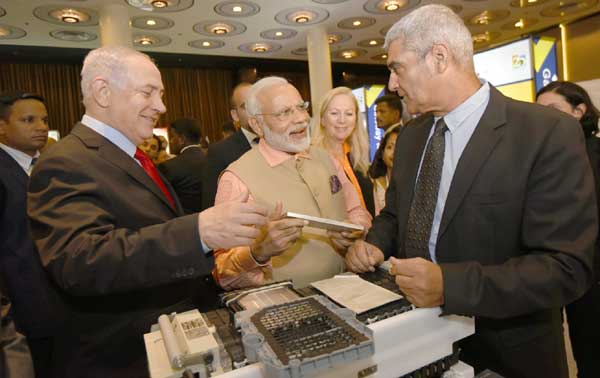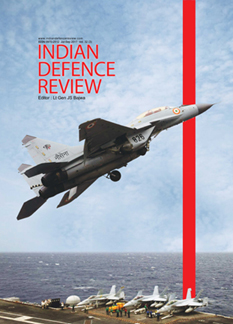Both countries carved their national identity as a fragile balance of cultures, religions and minorities. Both have significant expatriate communities in foreign countries, giving significant contribution to the country’s wealth, and international influence. For India, it was a struggle for unification and defending the borders from external threats. For Israel, it was the epic culmination of immigration movements that began in the 18th century, gathering the Jewish people from diaspora. The Jewish immigrants that returned to their homeland after 2000 years in exile established their homeland in the promised land, in the heart of a hostile region.
India, the world’s second largest nation, and Israel, among the smallest on the globe, have much in common. Both are young and old, with historical roots thousands of years old. Both emerged from British colonial rule to become independent states about 70 years ago. Both struggled in their first years of nationhood, in their pursuit of an independent economy and national sovereignty.
It was the Indo-Pakistani war in 1999 that brought the two countries together, as Israel rushed to supply India with critical military supplies for the war effort, at a time when India’s main provider – the Soviet Union – practically ceased to exist.
Both countries carved their national identity as a fragile balance of cultures, religions and minorities. Both have significant expatriate communities in foreign countries, giving significant contribution to the country’s wealth, and international influence.
For India, it was a struggle for unification and defending the borders from external threats. For Israel, it was the epic culmination of immigration movements that began in the 18th century, gathering the Jewish people from diaspora. The Jewish immigrants that returned to their homeland after 2000 years in exile established their homeland in the promised land, in the heart of a hostile region.
The First Years
In their first years India and Israel were far apart, but in the 1990s bilateral relations were crafted, first in secrecy and later in broad daylight, leading to the first presidential visit of Israel’s president Ezer Weizmann in India in 1996. India returned with a presidential visit to Israel 20 years later, with the historic visit of Prime Minister Narendra Modi in Israel earlier this year. Apart from the frequency of visits, the bilateral relations between the countries continued and improved over the years.
It was the Indo-Pakistani war in 1999 that brought the two countries together, as Israel rushed to supply India with critical military supplies for the war effort, at a time when India’s main provider – the Soviet Union – practically ceased to exist.
The generous helping hand offered by Israel during the Kargil War opened the doors for closer cooperation, mutual trust and deeper alliance between the military forces of the two countries. Following years of military buildup that relied on indigenous capabilities, in the early 2000s, Israel was well positioned to provide India with defense systems that could fulfill some of the needs the Russians were unable to deliver at that time. Modernization of Russian tanks and Russian produced helicopters and planes, conversion of aircraft into aerial refueling tankers and development of early warning radars denied by other suppliers were only the tips of the iceberg. The Indian side was keen to obtain and locally produce sophisticated systems, such as Electro-optical, communications and electronic warfare equipment, considered as strategic capabilities that Russia or other suppliers could not deliver at that time, and Western suppliers were not willing to provide.
Israel welcomes the new regulations under the ‘Make in India’ since the new rules enable Israeli companies to operate in India with more confidence.
Since those days the geopolitical map changed. India established its position as a dominant military and economic power, and, with ongoing modernization of its huge military force, evolved as the world’s largest defense importer. Now as Russia recovered its defense industry, both in the level of sophistication, production scale and competitiveness, India’s biggest suppliers are the world’s two superpowers. The USA that was reluctant to export to India in the past have entered the market with full swing driving billions in annual military sales. European manufacturers that went through conglomeration in recent years are now larger, hungrier and more powerful and influential, leveraging political pressure by European leaders to promote military sales. Can Israel maintain its position facing these odds?
While the Indian defense market is huge, it is also complex. Endurance needs extreme patience and commitment, to walk the long way with the customer, particularly in the changing landscape created by the new reforms. Overall, Israel welcomes the new regulations under the ‘Make in India’ since the new rules enable Israeli companies to operate in India with more confidence. The successful maturation of major projects, including the Phalcon AWACS and LRSAM naval defense systems, proved how Indo-Israeli development programs are over coming obstacles and succeed when both sides join in true partnership.
These programs were launched in times when Joint Ventures (JVs) were more challenging but culminated in a market environment much more hospitable for business as foreign companies can set up JVs in India with almost equal shares (49:51),in compliance with Indian rules on foreign direct investment (FDI).With a bigger stake in the business, foreign partners are more comfortable in sharing and transferring sensitive technologies needed by the Indian side, enabling the JV to leverage the full potential of future sales.
In the past, locally produced weapon systems were considered inferior and costlier to those produced by Original Equipment Manufacturers (OEM). Moreover, Transfer of Technology (TOT) demanded by the Indian authorities as part of major programs was never easy to fulfill, since foreign suppliers were reluctant to release technologies that could turn today’s partners into future competitors. Today, as the foreign side keeps an almost equal ownership in JVs, TOT can be done with more confidence. Furthermore, joint procurements, where both sides share the production and support, assure that manufacturing and supply chain will be efficient and meet the quality on both sides.
As an important and trustable ally, India has access to most of the technologies, systems and capabilities Israel can export…
The Indian market remains very attractive for the Israeli offerings, as, unlike its competitors from East and West, Israeli companies offer upgrades and enhancements to all types of equipment, from east, west as well as indigenous Indian systems. Combat aircraft, helicopters, vehicles and vessels, electronic equipment and air defenses, can all be improved with Israeli know-how. In the past,such upgrades relied primarily on Israel’s own combat experience, but today, many programs use research and development invested jointly by India and Israel, to field the most suitable equipment to fulfill the customer’s requirements.
Make with India
As a small country, export is what makes Israel unique. Unlike its competitors, that consider export secondary to their domestic and regional activities, Israel’s defense companies are all export oriented, with share of export ranging from 75% to 50% of their annual sales. On the other hand, research and development (R&D) is often oriented to address local needs. Leveraging joint research and development programs Israel could benefit from R&D cost sharing, with industries leveraging the follow-on sales and support of such products through their JVs with Indian companies.
Israel’s defense establishment has recognized this opportunity and Israel’s Ministry of Defense (MOD) named the cooperation with India in the highest priority, by streamlining the activities of Defense R&D Agency (Mafat), Defense Export Control Regulator (API), Security and Defense Export and International Cooperation Directorates. All these stakeholders are brought together to speed up permissions and processes and minimize bureaucracy to promote Israeli-Indian cooperation.
As an important and trustable ally, India has access to most of the technologies, systems and capabilities Israel can export and is now sharing research and development of future systems and capabilities that will gain their military forces an overmatch over future adversaries.
Today Israel buys most of its military hardware from abroad, but even without producing major platforms, it is ranked among the world’s top 10 arms exporters.
Make in Israel – lessons learned
In the 1950s – 1970s Israel went through government directives that imposed ‘Made in Israel’ policy, aimed to encourage the use of domestic products and establishment of local industrial ventures regardless of efficiency or scale. This policy came to a climax in the 1970s, under the international embargo that followed the Six Day War in 1967, when Israel was cut off its defense suppliers in France and the UK and had to develop self-reliance in major weapon systems over a period of few years. This dramatic turn caused government owned companies to expand and scale up their operation, and also encouraged the private sector to join the supply line as subcontractors and manufacturers of specialty products, creating a new industrial ecosystem that supported Israel’s rapid military growth. The Yom Kippur War, the war that followed in six years accelerated this process added to Israel’s accepting the need for self-reliance but also realizing its costs and limits.
By then Israel was producing its combat planes, missile boats, and armored vehicles. A decade later, Israeli government canceled the Lavi – Israel’s indigenous fighter program. Israel decided to buy combat aircraft off the shelf from the USA, and shift investments to new areas that would provide overmatch over its adversary well into the future. Intelligent standoff weapons, guided missiles and drones were among those ‘surprises’ that overwhelmed Israel’s enemies in the battles and became popular defense export items.
Today Israel buys most of its military hardware from abroad, but even without producing major platforms, it is ranked among the world’s top 10 arms exporters. The fact that Israel does not provide main platforms, and some of the world’s biggest markets are closed to Israeli exports makes Israel a major competitor in the markets it is active in – Asia, Europe, and North and Latin America.
Excellence and innovation are among the main drivers of this competitiveness and success. Embracing the digital revolution and technological race, Israel no longer seeks a ‘Made in Israel’ attitude for everything, but rather those that are truly unique and superior over what can be obtained abroad. This attitude is more suitable to Israel’s typical innovative character and is what makes Israeli products competitive abroad. As such, Israel acts as a ‘testing lab’ for new products, enabling local companies to expand overseas with a competitive advantage that bigger and slower companies rarely have. On the national level support is given to certain areas deemed critical for national defense or other priorities, in investments, regulation and other forms of assistance, nurturing ‘’centers of excellence’’ for the defense industry, electro-optics, security and cyber, as well as agro technology, water, and health.







Good article. Hope India and Israel Co-operate more with Make in India. Long overdue.